Episodes
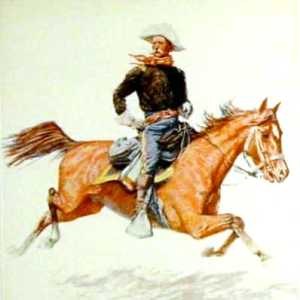
Tuesday Sep 25, 2018
The Virginian: Wyoming Cowboys and the Liberal Arts with Prof. Kyle Washut
Tuesday Sep 25, 2018
Tuesday Sep 25, 2018
The train passengers watched as one cowboy after another tried to rope an uncooperative horse. “Then for the first time I noticed a man who sat on the high gate of the corral, looking on. For he now climbed down with the undulations of a tiger, smooth and easy, as if his muscles flowed beneath his skin. The others had all visibly whirled the rope, some of them even shoulder high. I did not see his arm lift or move. He appeared to hold the rope down low, by his leg. But like a sudden snake I saw the noose go out its length and fall true; and the thing was done. As the captured pony walked in with a sweet, church-door expression, our train moved slowly on to the station, and a passenger remarked, ‘That man knows his business.’” Thus begins Owen Wister’s 1902 novel The Virginian.
Being Wyoming Catholic College, we used Wister’s tale about Wyoming in the 1870s as the subject of a recent all-school seminar. Our entire school community read the book and met in groups for discussion followed by dinner, roping, oil-barrel bull rides, black powder rifles, and Western dancing.
Prof. Kyle Washut, a Wyoming native, has long loved the book and is our guest on this edition of The After Dinner Scholar.
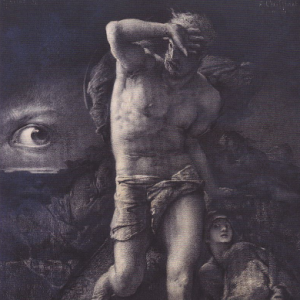
Tuesday Sep 18, 2018
Veritatis Splendor and Conscience with Dr. Kent Lasnoski
Tuesday Sep 18, 2018
Tuesday Sep 18, 2018
Last week theologian Dr. Jeremy Holmes gave us an introduction to St. John Paul II’s 1993 encyclical, Veritatis Splendor, The Splendor of Truth.
St. John Paul II wrote the encyclical in response to trends in moral theology that for the most part denied that morality can be universal, objective, and permanent.
He critiqued any doctrines that would “grant to individuals or social groups the right to determine what is good or evil.”
Yet we make judgments about good and evil every day and the source of those judgments is our consciences.
Dr. Kent Lasnoski teaches moral theology at Wyoming Catholic College and has for many years been a student of St. John Paul II and his ethical writings. In this edition of The After Dinner Scholar, he explains the nature of conscience in Pope St. John Paul's writings.
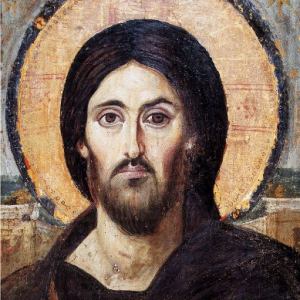
Tuesday Sep 11, 2018
"The Splendor of Truth" Twenty-Five Years Later (Part 1) with Dr. Jeremy Holmes
Tuesday Sep 11, 2018
Tuesday Sep 11, 2018
As George Weigel’s biography of St. John Paul II makes clear, even as a young man, Karol Wojtyła had a passionate concern for truth. In his theological and philosophical studies, the question “What is truth?” was utmost in his mind along with the question of how to communicate the truth to others. And truth became a theme of his pontificate.
Twenty-five years ago last month on August 6, 1993, the Feast of the Transfiguration, John Paul promulgated the encyclical Veritatis Splendor, The Splendor of Truth. What he had to say needed to be heard twenty-five years ago and needs to be heard with even greater urgency today.
In this week’s podcast, part one of a two part series, Dr. Jeremy Holmes explains the need for the encyclical, the argument St. John Paul made, and some of the errors he addressed.
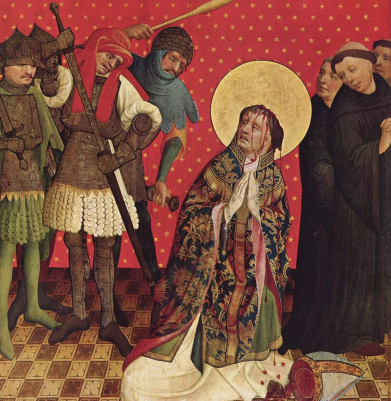
Tuesday Sep 04, 2018
Courage, Martyrdom, and "Murder in the Cathedral" with Prof. Kyle Washut
Tuesday Sep 04, 2018
Tuesday Sep 04, 2018
I see nothing quite conclusive in the art of temporal government,
But violence, duplicity and frequent malversation.
King rules or barons rule:
The strong man strongly and the weak man by caprice.
They have but one law, to seize the power and keep it.
And the steadfast can manipulate the greed and lust of others.
The feeble is devoured by his own.
Those words are from T. S. Eliot’s play “Murder in the Cathedral,” the story of tSt. Thomas Becket's martyrdom. Becket was King Henry II pal who he appointed Chancellor and then Archbishop of Canterbury. As Chancellor, Becket was Henry’s man to do the king’s will. But when he became Archbishop, something changed. He realized that he now needed to be God’s man, a decision that—given the outcomes—enraged Henry.
Prof. Kyle Washut discussed Eliot, Thomas, and what he called “Perfected Courage” at the 2018 Wyoming School of Catholic Thought. Prof. Washut is our guest this week on The After Dinner Scholar.
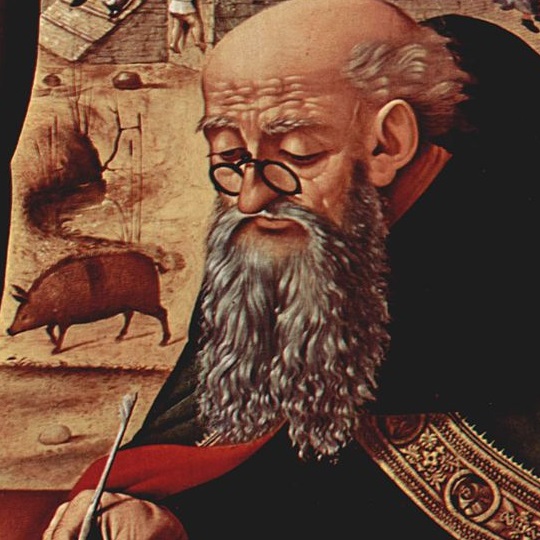
Tuesday Aug 28, 2018
Lecture - St. Antony and Purifying Courage by Prof. Kyle Washut
Tuesday Aug 28, 2018
Tuesday Aug 28, 2018
For Achilles, Hector who killed Patroclus was the great enemy. For Antigone, it was Creon the tyrant. For Aristotle, it was those attacking the city. Each case called for courage. But in the Christian era, something changed.
When Christians in the fourth century thought of courage, St. Antony came to mind. He led no army, fomented no rebellion against human tyrants, and did not defend any city. Instead Antony was a paragon of the courage it takes to battle the world, the devil, and the flesh, that is, our inner self, our sin nature.
At the Wyoming School of Catholic Thought, Prof. Kyle Washut lectured on St. Athanasius’ masterful “Life of Antony.” Here are his comments on that life and this new way of understanding courage.
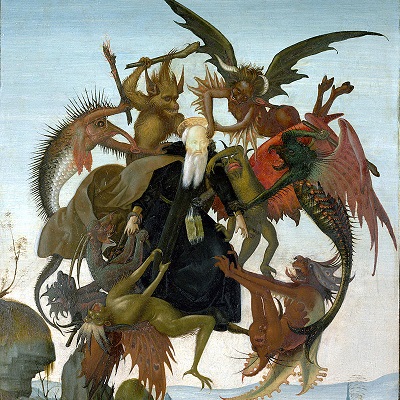
Tuesday Aug 28, 2018
St. Antony and the Courage That Purifies with Prof. Kyle Washut
Tuesday Aug 28, 2018
Tuesday Aug 28, 2018
“When St. Antanasius composed Life of Antony in 365,” noted Prof. Kyle Washut at the 2018 Wyoming School of Catholic Thought, “he produced an instant best seller and a new genre of literature.”
While Life of Antony was a sensation in the fourth century, Prof. Washut noted that for twenty-first century readers—even those who share Antony’s Christian faith—the book can “be difficult if not outright off-putting” and “even repulsive.”
Is the problem something about Antony or is it something about us? How do we understand Antony’s life, mission, and courage in all those battles with the devil and his demons?
Prof. Washut is our guest this week on The After Dinner Scholar.
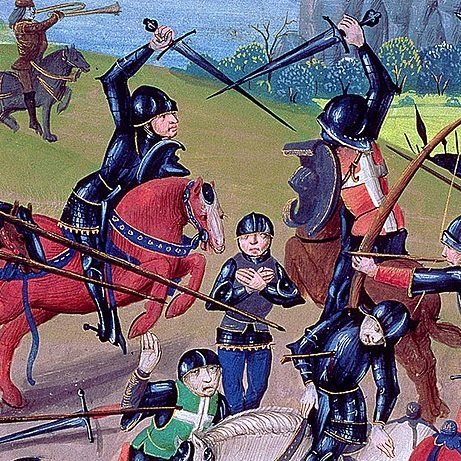
Tuesday Aug 21, 2018
Tuesday Aug 21, 2018
His dad was king of England… or at least sort of. That being the case, how does a usurper’s son create legitimacy?
After the death of Henry IV of England, Prince Hal as everyone has been calling him, has a plan to establish himself on the throne as Henry V despite his shaky claim to the crown. His success depends on careful planning, courageous battling, and--to his surprise--divine Providence.
At the Wyoming School of Catholic Thought in June, Dr. Glenn Arbery, president of Wyoming Catholic College explained how Shakespeare told the tale of Prince Hal in the play "Henry V."
Here are Dr. Arbery’s remarks in their entirety.
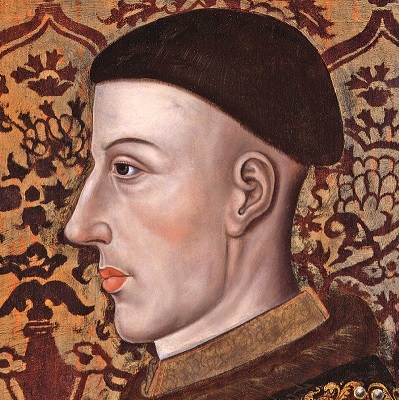
Tuesday Aug 21, 2018
Courage, Henry V, and St. Crispin's Day Eve with Dr. Glenn Arbery
Tuesday Aug 21, 2018
Tuesday Aug 21, 2018
On October 25 here at Wyoming Catholic College, it is tradition for someone to stand on a cafeteria table at lunch and ask in a loud voice, “What’s he that wishes so? My cousin Westmoreland?”
October 25 is St. Crispin’s Day and those two questions begin the St. Crispin’s Day speech given by King Henry in Act IV, Scene iii of Shakespeare’s play “Henry V.”
Henry of England, having invaded France is faced with a decisive battle in which he is badly outnumbered. In discussing the situation, the Duke of Westmoreland wishes for more troops. Henry’s response takes him by surprise: I’d just as soon there were fewer.
Dr. Glenn Arbery explains how this play and the speech teach us about courage on this edition of The After Dinner Scholar.
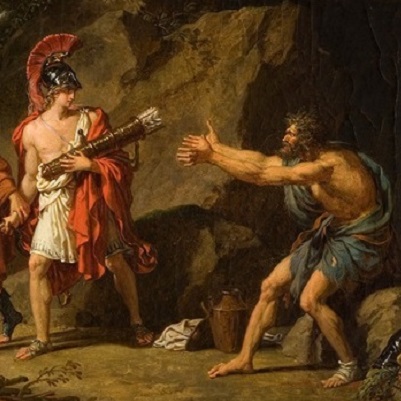
Tuesday Aug 14, 2018
Lecture - Courage and "The Cure at Troy" by Dr. Virginia Arbery
Tuesday Aug 14, 2018
Tuesday Aug 14, 2018
Hercules, that greatest of all Greek heroes, possessed a mighty and magical bow that bequeathed to a man named Philoctetes.
Sailing from Greece to invade Troy and bring back Helen, Philoctetes received a wound on his foot that became foul and festering. So foul and festering that people couldn’t stand being near him and so the decision was made to maroon him alone on a deserted island with his bow.
But the Trojan War went badly for the Greeks and they knew that they could not win without Philoctetes’ bow. The question was how to get it back from Philoctetes who, after ten years on his island, was bitterly angry at Odysseus and the other Greek leaders who had left him.
At the Wyoming School of Catholic Thought, Dr. Virginia Arbery discussed the story of Philoctetes in modern Irish author Seamus Heaney’s play “The Cure at Troy.”
Here are her remarks.
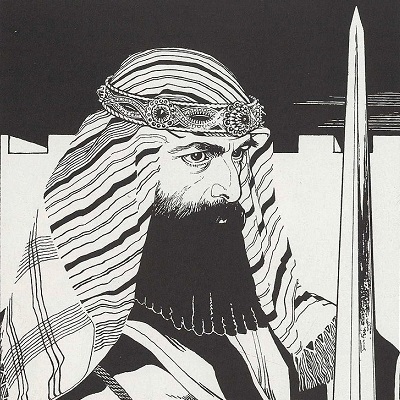
Tuesday Aug 07, 2018
Tuesday Aug 07, 2018
“Have I not commanded you?” God said to Joshua, “Be strong and of good courage; be not frightened, neither be dismayed; for the Lord your God is with you wherever you go.”
The Bible, to no one’s surprise, is filled with examples of courage. Moses stood up to Pharaoh, David ran to battle Goliath with nothing but a sling and a few stones, Elijah called out King Ahab, Peter stood up to the Sanhedrin and eventually the Roman authorities who put him to death. G. K. Chesterton, commenting on Jesus praying in the Garden of Gethsemane said, “Alone of all creeds, Christianity has added courage to the virtues of the Creator.”
At the Wyoming School of Catholic Thought in June, Dr. Jim Tonkowich spoke about the meaning of courage in the Bible, focusing on the Old Testament story of Joshua.
Here are his remarks in their entirety.

